#thai group
Text
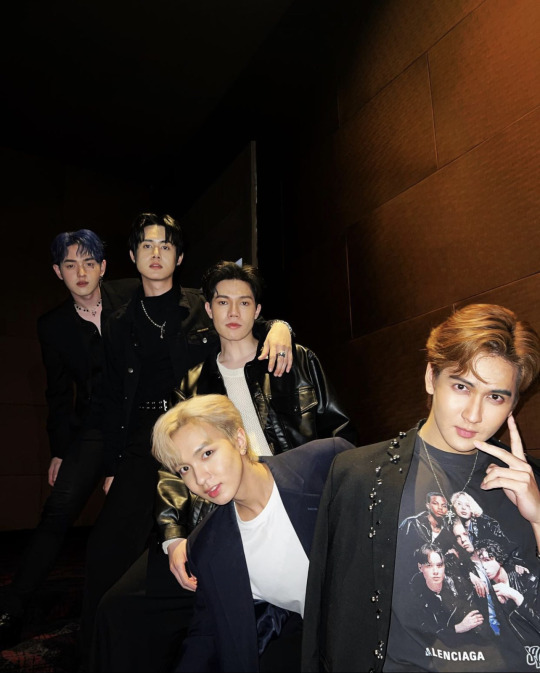
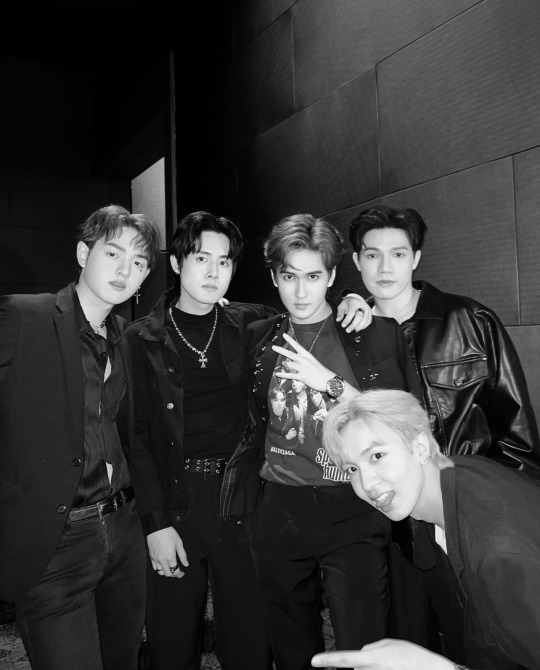
element
#element#elementth#tikitakata#my babies#bonus#bank#tora#kadploy#buzz#element bank#element bonus#element tora#element kadploy#element buzz#star hunter#thai pop#tpop#thai group#bank thanathip#buzz norravit#bonus thanadech#kad ploysupa#bank toranin
3 notes
·
View notes
Text
Red Lobster was killed by private equity, not Endless Shrimp

For the rest of May, my bestselling solarpunk utopian novel THE LOST CAUSE (2023) is available as a $2.99, DRM-free ebook!

A decade ago, a hedge fund had an improbable viral comedy hit: a 294-page slide deck explaining why Olive Garden was going out of business, blaming the failure on too many breadsticks and insufficiently salted pasta-water:
https://www.sec.gov/Archives/edgar/data/940944/000092189514002031/ex991dfan14a06297125_091114.pdf
Everyone loved this story. As David Dayen wrote for Salon, it let readers "mock that silly chain restaurant they remember from their childhoods in the suburbs" and laugh at "the silly hedge fund that took the time to write the world’s worst review":
https://www.salon.com/2014/09/17/the_real_olive_garden_scandal_why_greedy_hedge_funders_suddenly_care_so_much_about_breadsticks/
But – as Dayen wrote at the time, the hedge fund that produced that slide deck, Starboard Value, was not motivated by dissatisfaction with bread-sticks. They were "activist investors" (finspeak for "rapacious assholes") with a giant stake in Darden Restaurants, Olive Garden's parent company. They wanted Darden to liquidate all of Olive Garden's real-estate holdings and declare a one-off dividend that would net investors a billion dollars, while literally yanking the floor out from beneath Olive Garden, converting it from owner to tenant, subject to rent-shocks and other nasty surprises.
They wanted to asset-strip the company, in other words ("asset strip" is what they call it in hedge-fund land; the mafia calls it a "bust-out," famous to anyone who watched the twenty-third episode of The Sopranos):
https://en.wikipedia.org/wiki/Bust_Out
Starboard didn't have enough money to force the sale, but they had recently engineered the CEO's ouster. The giant slide-deck making fun of Olive Garden's food was just a PR campaign to help it sell the bust-out by creating a narrative that they were being activists* to save this badly managed disaster of a restaurant chain.
*assholes
Starboard was bent on eviscerating Darden like a couple of entrail-maddened dogs in an elk carcass:
https://web.archive.org/web/20051220005944/http://alumni.media.mit.edu/~solan/dogsinelk/
They had forced Darden to sell off another of its holdings, Red Lobster, to a hedge-fund called Golden Gate Capital. Golden Gate flogged all of Red Lobster's real estate holdings for $2.1 billion the same day, then pissed it all away on dividends to its shareholders, including Starboard. The new landlords, a Real Estate Investment Trust, proceeded to charge so much for rent on those buildings Red Lobster just flogged that the company's net earnings immediately dropped by half.
Dayen ends his piece with these prophetic words:
Olive Garden and Red Lobster may not be destinations for hipster Internet journalists, and they have seen revenue declines amid stagnant middle-class wages and increased competition. But they are still profitable businesses. Thousands of Americans work there. Why should they be bled dry by predatory investors in the name of “shareholder value”? What of the value of worker productivity instead of the financial engineers?
Flash forward a decade. Today, Dayen is editor-in-chief of The American Prospect, one of the best sources of news about private equity looting in the world. Writing for the Prospect, Luke Goldstein picks up Dayen's story, ten years on:
https://prospect.org/economy/2024-05-22-raiding-red-lobster/
It's not pretty. Ten years of being bled out on rents and flipped from one hedge fund to another has killed Red Lobster. It just shuttered 50 restaurants and declared Chapter 11 bankruptcy. Ten years hasn't changed much; the same kind of snark that was deployed at the news of Olive Garden's imminent demise is now being hurled at Red Lobster.
Instead of dunking on free bread-sticks, Red Lobster's grave-dancers are jeering at "Endless Shrimp," a promotional deal that works exactly how it sounds like it would work. Endless Shrimp cost the chain $11m.
Which raises a question: why did Red Lobster make this money-losing offer? Are they just good-hearted slobs? Can't they do math?
Or, you know, was it another hedge-fund, bust-out scam?
Here's a hint. The supplier who provided Red Lobster with all that shrimp is Thai Union. Thai Union also owns Red Lobster. They bought the chain from Golden Gate Capital, last seen in 2014, holding a flash-sale on all of Red Lobster's buildings, pocketing billions, and cutting Red Lobster's earnings in half.
Red Lobster rose to success – 700 restaurants nationwide at its peak – by combining no-frills dining with powerful buying power, which it used to force discounts from seafood suppliers. In response, the seafood industry consolidated through a wave of mergers, turning into a cozy cartel that could resist the buyer power of Red Lobster and other major customers.
This was facilitated by conservation efforts that limited the total volume of biomass that fishers were allowed to extract, and allocated quotas to existing companies and individual fishermen. The costs of complying with this "catch management" system were high, punishingly so for small independents, bearably so for large conglomerates.
Competition from overseas fisheries drove consolidation further, as countries in the global south were blocked from implementing their own conservation efforts. US fisheries merged further, seeking economies of scale that would let them compete, largely by shafting fishermen and other suppliers. Today's Alaskan crab fishery is dominated by a four-company cartel; in the Pacific Northwest, most fish goes through a single intermediary, Pacific Seafood.
These dominant actors entered into illegal collusive arrangements with one another to rig their markets and further immiserate their suppliers, who filed antitrust suits accusing the companies of operating a monopsony (a market with a powerful buyer, akin to a monopoly, which is a market with a powerful seller):
https://www.classaction.org/news/pacific-seafood-under-fire-for-allegedly-fixing-prices-paid-to-dungeness-crabbers-in-pacific-northwest
Golden Gate bought Red Lobster in the midst of these fish wars, promising to right its ship. As Goldstein points out, that's the same promise they made when they bought Payless shoes, just before they destroyed the company and flogged it off to Alden Capital, the hedge fund that bought and destroyed dozens of America's most beloved newspapers:
https://pluralistic.net/2021/10/16/sociopathic-monsters/#all-the-news-thats-fit-to-print
Under Golden Gate's management, Red Lobster saw its staffing levels slashed, so diners endured longer wait times to be seated and served. Then, in 2020, they sold the company to Thai Union, the company's largest supplier (a transaction Goldstein likens to a Walmart buyout of Procter and Gamble).
Thai Union continued to bleed Red Lobster, imposing more cuts and loading it up with more debts financed by yet another private equity giant, Fortress Investment Group. That brings us to today, with Thai Union having moved a gigantic amount of its own product through a failing, debt-loaded subsidiary, even as it lobbies for deregulation of American fisheries, which would let it and its lobbying partners drain American waters of the last of its depleted fish stocks.
Dayen's 2020 must-read book Monopolized describes the way that monopolies proliferate, using the US health care industry as a case-study:
https://pluralistic.net/2021/01/29/fractal-bullshit/#dayenu
After deregulation allowed the pharma sector to consolidate, it acquired pricing power of hospitals, who found themselves gouged to the edge of bankruptcy on drug prices. Hospitals then merged into regional monopolies, which allowed them to resist pharma pricing power – and gouge health insurance companies, who saw the price of routine care explode. So the insurance companies gobbled each other up, too, leaving most of us with two or fewer choices for health insurance – even as insurance prices skyrocketed, and our benefits shrank.
Today, Americans pay more for worse healthcare, which is delivered by health workers who get paid less and work under worse conditions. That's because, lacking a regulator to consolidate patients' interests, and strong unions to consolidate workers' interests, patients and workers are easy pickings for those consolidated links in the health supply-chain.
That's a pretty good model for understanding what's happened to Red Lobster: monopoly power and monopsony power begat more monopolies and monoposonies in the supply chain. Everything that hasn't consolidated is defenseless: diners, restaurant workers, fishermen, and the environment. We're all fucked.
Decent, no-frills family restaurant are good. Great, even. I'm not the world's greatest fan of chain restaurants, but I'm also comfortably middle-class and not struggling to afford to give my family a nice night out at a place with good food, friendly staff and reasonable prices. These places are easy pickings for looters because the people who patronize them have little power in our society – and because those of us with more power are easily tricked into sneering at these places' failures as a kind of comeuppance that's all that's due to tacky joints that serve the working class.

If you'd like an essay-formatted version of this post to read or share, here's a link to it on pluralistic.net, my surveillance-free, ad-free, tracker-free blog:
https://pluralistic.net/2024/05/23/spineless/#invertebrates
#pluralistic#bust-outs#private equity#pe#red lobster#olive garden#endless shrimp#class warfare#debt#looters#thai union group#enshittification#golden gate#monopsony#darden#alden global capital#Fortress Investment Group#food#david dayen#luke goldstein
6K notes
·
View notes
Text

























"Don't leave my friend again, understand?"
#the trainee#the trainee the series#the trainee series#janeryan#offgun#jane x ryan#off jumpol#gun atthaphan#piploy kanyarat#view benyapa#sea tawinan#poon mitpakdee#thai drama#gmmtv#my gifs#bypiningbisexuals#a new crackship is born LMAO#this should've been a pah speech tho lol where did this rudeness come from tae is usually so soft#he ate with that tho lmao#I really loved having this full group scene with jane tho <3
306 notes
·
View notes
Text




Do I like P'Jane?
The Trainee: The Series, premieres June 30th, 2024
#the trainee#the trainee the series#gun atthaphan#offgun#view benyapa#sea tawinan#piploy kanyarat#poon mitpakdee#gmmtv series#thai bl#th: the trainee#i know i already like the trainees they look like they have one shared braincell and i appreciate that about a core group#they all also look super pretty#and as your resident only friends outfits displayer ryan's shirt is the same one that nick uses in the last ep of of#which we know it's something gmm does in their series and out of it too with their artists' events#(the day piploy used the same pink heart sweater as khaotung did in the fanta event i was the happiest tbh)#(one day i'll have firstkhao working with piploy and emi and that day i can die happy)#bibi gifs
256 notes
·
View notes
Text
The thing I love about the friend groups in We Are (merging now to become one friend group) is that they give each other PRODIGIOUS amounts of shit, about every fucking thing on the planet, but the minute one of them seriously needs something? They are so so so tender with one another.
That, pals, is a found family par excellence.
140 notes
·
View notes
Text




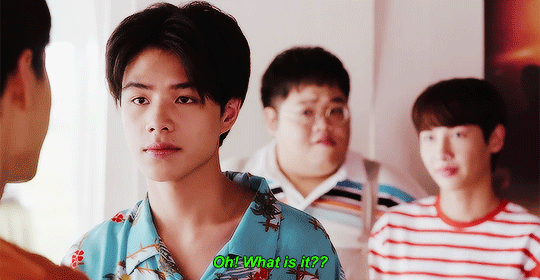



"for real?"
#cooking crush#cooking crush the series#cooking crush ep10#firedynamite#fire x dynamite#neoaungpao#neo trai#aungpao ochiris#gmmtv#thai bl#bl drama#theyre so fcuking annoying i hate ppl in love#(very affectionate)#😩😩😩#aso samsee and prem in the background had me screaming lmao#legit me in front of the screen dkjhgfd#ughhhhh#the 3 of them made my top 3 favorite friend groups in bls tbh#like i love their friendship so much its making me emotional lol#i love me a good bestie squad 🥺
274 notes
·
View notes
Text
This shouldn't be a hot take but if I replace the word "zionist" with "Jew" in you post, and it now looks like an excerpt from Mein Kampf, I don't think you can call yourself left wing anymore.
#jumblr#antisemitism#its not difficult to not be an antisemite and yet people are failing at the furst hurdle of not being a raging bigot#refusing to engage with jews when discussing a topic that affects them is literally a colonial superiority mindset thay you are better#and if you think you are more knowledgeable and intelligent and know whats best for a minortiy ethnic group#then boy (gn) have i got some news for you about colonial mindsets
189 notes
·
View notes
Text

Opened paint tool sai for the first time in 5 years immediately drew yuri
#couldnt for the life of me draw shizukus face jeezus. turned out ok#I LOVE SAIS BRUSHES I MISSED THEM!!!!!! BRUSH TOOL MY BELOVED!!!!!!!!!#art tag#prsk#pjsk#read all main stories reading through the early events rn. fun#might skip to the recent niigo events tho bc that looks crazy#wont be as good without the build up of the other events but....... mafuyu........#wannna do that thing thats like fav character from each group for prsk.... and maybe bandori/enstars/twst too. but prob not.#aneeway. these two. wehehhehehwhehehw#shizuku hinomori#airi momoi#project sekai#shizuai#almost didnt tag their ship my bad#okie this tagging this is so hard theres so many. can we decide on if its prsk or pjsk#uhm thays all. gootbye#going back to hiding in my literal closet to record audio for an assignment#OH DONT LOOK AT AIRIS HAND I FORGOT TO FIX IT EHHE. MY BAD. UGH
433 notes
·
View notes
Text
QL of All Time - Round 6: Kinnporsche (2022) vs The Handmaiden (2016)


#ql of all time#asianlgbtqdramas#kinnporsche#kinnporsche the series#thai ql#thai bl#the handmaiden#korean ql#korean gl#round 6#group 5
79 notes
·
View notes
Text







Jan via her Insta!
#janhae ployshompoo#jan ployshompoo#cherry magic thai#cherry magic thailand#cherry magic th#cherry magic#sizzy girl group#sizzy#cupid’s last wish#the warp effect the series#the warp effect#peaceful property#***
157 notes
·
View notes
Text
Posting this cause tbh this needs to be posted in here
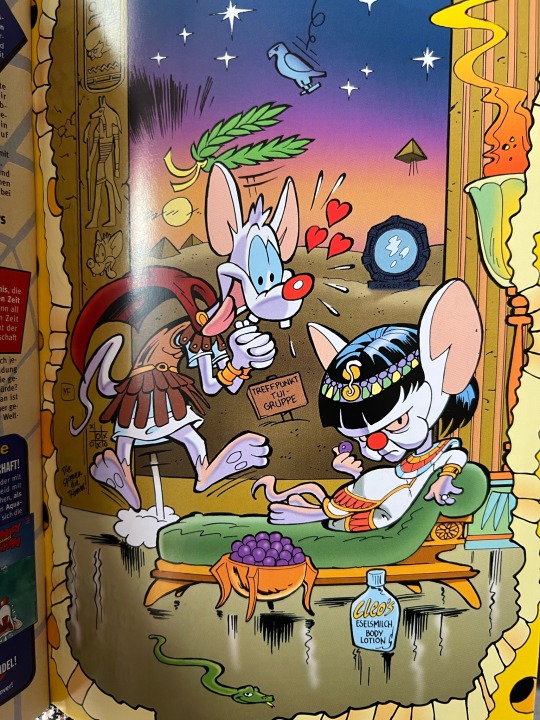
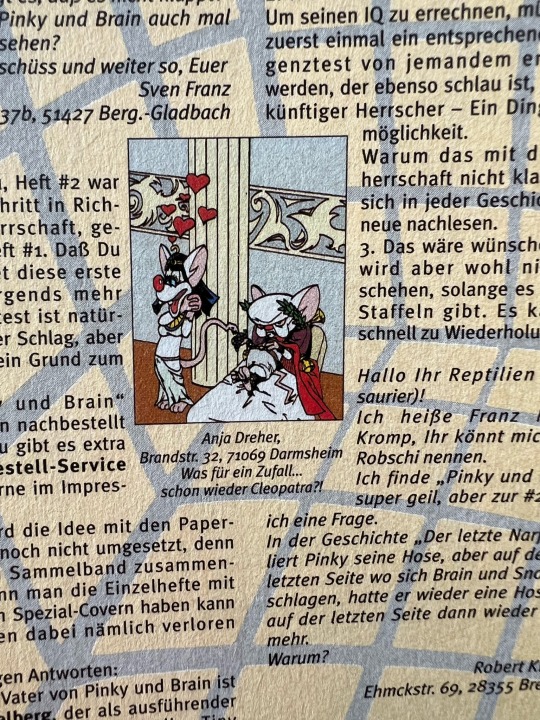
I'm thinking of scanning these some time soon
#animaniacs#Animaniacs comics#pinky and the brain#patb#patb comics#pinky and the brain comics#getting myself patb comics but in German dub cause first thays the only vers I can get the most cheapest and easier#second I always wondered how they looked like I always knew they translated the comics in German but I barely saw any pages of it or so#I'm glad to know Germany has exclusive weird brinky fanart#reading the pages is so interesting there were two fandom group recommendations one normal patb fan club and one with patb and the simpsons#it was called the big yellow and the little white I think#it's really silly#also the more closely I look at this image the more I realize this is definitely a reference to asterix and obelix especially#the cleo brain image and with closer inspections you see a common line from that cartoon#German patb comic#can't wait to collect more I got 3 more issues and I wanna see how they are like so I'll update 👍
145 notes
·
View notes
Text



Their groovy little dance for @iguessitsjustme
Bonus: The whole thing in one gif

#only boo#only boo the series#tiny friendship group#groovy dance#thai bl#thai drama#bl series#thai series#thaibl#asianlgbtqdramas#asian lgbtq dramas#bl drama#thai bl series#thai bl drama#gmmtv series#gmmtv#gmmtv bl#gmmtv boys
111 notes
·
View notes
Text
Danmei tropes in My Stand-In
This is a quick introduction to some popular BL tropes that are fairly new to live-action BL:
wife chasing crematorium
substitute lover
transmigration
(Contains spoilers)
All corrections and critiques are welcome.
As you probably know My Stand-In is based on the danmei novel Professional Body Double. Specifically, it belongs to 188男团 (“188 group” where 188 cm is the height of every gong (seme) in the novel series). It is a shared universe of novels with characters from one featuring in another and almost all gong are very scummy (or “red-flag” so to speak) initially.
Trope #1: wife chasing crematorium
What 188 group novels all have in common is the trope popularly known among English-speaking fandom as “wife chasing crematorium”. This is a super-popular trope, not only in danmei.
origin
追妻火葬场 (zhuī qī huǒzàng chǎng; chasing his wife’s crematorium)
derived from the longer phrase 傲娇一时爽,追妻火葬场 (àojiāo yīshí shuǎng, zhuī qī huǒzàng chǎng; Tsundere was on his high horse for a while, now chasing his wife’s crematorium.)
Alternative form: 追夫火葬场 (zhuī fū huǒzàng chǎng; chasing husband’s crematorium) – usually involves scum shou (uke) chasing after his gong (seme) after initially abusing gong’s love.
The trope involves the love interest being initially cold or even cruel to the protagonist who is in love. This continues until all of that love gone. By then, the love interest would have come to his senses, eager to seek forgiveness and chase after the protagonist. In some cases, the love is already lost irrevocably, especially when the protagonist is dead – hence, literal crematorium. There are also works where the love interest is discarded all together and protagonist moves on to someone else. Rarely, there are works where the protagonist is the scum.
In 188 group novels, this is how the basic structure of wife chasing crematorium:
Shou loves gong. Gong treats shou terribly.
Gong goes too far. Shou is fed-up and leaves gong, one way or other. Gong realises that he has been in love all along.
Gong regrets his action and chases after shou. Grovelling ensues.
Gong and shou gets back together. Gong dotes on shou and the couple face other challenges (family, villains) together, if any. Happy ending.
Fans are in it for the melodrama. They want to watch scummy gong to go too far, the relationship to break down and for the gong to grovel and make amends through various selfless deeds, until they reestablish the relationship and trust (as much as possible). Every one of those stories end with a happy ending with the gong endlessly doting on shou and the relationship having turned wholesome.
Trope #2: substitute lover
Other than the previous trope Professional Body Double and its adaptation My Stand-In involves the “substitute lover” trope.
Substitute lover trope involves, usually the gong, having a 白月光 (white moonlight): a person whom he loves a lot but can’t reach/touch. This is usually his first love and has a profound impact on him.
Aside: White moonlight in itself is a common trope. Both Vip Only and Sahara Sensei to Toki-kun used white moonlight trope to in a typical kishōtenketsu narrative structure.
Since white moonlight is unattainable, gong finds a substitute lover.
The relationship between gong and substitute lover is usually just physical. This is because gong doesn’t plan to move on from white moonlight, instead stubbornly carries the torch. Gong doesn’t plan on betraying the pure feeling he have for his white moonlight by giving any of his love to anyone else. So, he tries to ensure that no love leaks out of the dam he has built to store his love for the white moonlight. This is, from gong’s POV, a kind of emotional fidelity which he extends to his white moonlight. A tribute of gong’s unshakable love for his white moonlight.
The substitute lover sometimes resembles white moonlight in some way –
in body – first ever live action BL (shonen-ai actually) adaptation Summer Vacation 1999 (1988) based of Hagio Moto’s The Heart of Thomas plays around with this trope, a lot. More recently, Playboyy sorta lampshaded it with the twins premise.
in spirit – a recent example is Love is Better the Second Time Around wherein prof. Takashi sleeps with his assistant Shiraishi Yuto because the assistant (or his desperation at least) reminded him of his white moonlight Miyata Akihiro.
Aside: There is only one live-action BL that actively subverted this trope: HIStory3: Make Our Days Count. The series introduced a doppelgänger of Yu XiGu (Xiang HaoTing’s white moonlight), a perfect candidate for substitute lover trope. But instead of pursuing it, they subverted the trope.
There are usually two outcomes to the substitute lover trope:
gong falls for substitute lover. In some cases, this involves white moonlight turning into rival or villain.
gong and his white moonlight get together. In this case, substitute lover turn into rival or get a lover of his own.
Itsuka no Kimi e, first ever live-action adaptation of a yaoi manga, employed substitute lover trope in one of its best executions. It is so brilliantly done that I can’t think of anything topping that, unless 4th volume (particularly the case-solving plot involving the photography club) of Takumi-kun series gets live action adaptation.
Trope #3: transmigration
Basic premise of Professional Body Double and its adaptation My Stand-In revolves around transmigration of soul.
This too is a popular trope in BL. One of the most popular danmei Mo Dao Zu Shi and its adaptation The Untamed involves this trope.
Maybe I should say set-up instead of trope for this one. Transmigration involves soul of a character getting transferred to a body different from his own at the time of triggering event.
Own body, different time – either past or future. When past is involved, it is likely a do-over story where the protagonist gets to redo their life, change their love interest, make different life choices, take different course of action, etc.
Reincarnation – completely different lifetime but with retained memories of past-life/lives. Until We Meet Again; Choco Milk Shake (different lifetime for the pets)
Different body, present (near-present) time – character’s soul enters a different person’s body. The character gets involved in his previous circumstances but now in a different capacity. Revive (2016), that danmei adaptation no one ever talks about, went to town with this set-up.
Different body, different life – soul enters character in a book, game, simulation, etc. and would be primarily tasked to thrive there. One Room Angel (2023) explored a type of badro with this set-up.
With transmigration set-up, it is common to have one of these two:
Transmigrator retaining some connection to previous life.
Transmigrator’s previous life doesn’t matter anymore.
These Tropes in My Stand-In
These tropes are explored to varying degrees and with different levels of efficiency in Professional Body Double. In its live-action adaptation, there are a bunch of limitations. Primary one being the cultural difference – audience of a danmei novel are already familiar with these tropes to some extend but the live-action audience is one which has been primarily consuming sweet BL from Thailand that are inherently deficient in BL literacies.
Another is the khujin problem. Branded pairs are very important to Thai BL industry, so they cannot have two different actors playing before and after transmigration. (Actually, this was not impossible but there hasn’t been any precedent. Also, The Untamed enjoyed success by having Xiao Zhan play pre- and post-transmigration Wei WuXian. I wish they tried two khujin (UpPoom & UpWinner) one couple, since they chose to introduce Winner as pre-transmigration Joe. I don’t know, maybe that’s asking for fan wars and pitting actors against each other.)
[In the tags, @deliriousblue reflects on what having two different actors could do with example from Cupid's Last Wish (a series I haven't watched) and its impact on audience on an emotional level.
@myezblog has commented that Alchemy of Souls (another I haven't watched) is an excellent example of transmigration played two different actors.]
Third limitation is one that comes from medium – you can’t have long monologues in live-action. This deprives audience of the inner workings of character’s minds. Most of the motives, especially Ming’s trouble with warring desires of his heart, is inaccessible to the audience. @clairedaring have posted a deep-dive by Liltsu into some of that here.
Aside: Another interesting trope is giving watch (a taboo gift) – Chinese superstition rising from 送钟 (gifting watch) and 送终 (to bury the dead/attend funeral) being homophones. Taboo gift trope - white lilies associated with death and funerals - have appeared in Summer Vacation 1999 (1988) and Forbidden Love; both of these have substitute lover and death.
Ming’s characterization as a young master, coming from money and prestige that breeds arrogance and deficient in empathy (this post by @tungtung-thanawat is particularly enlightening) is a highlight of his cruelty as a 188 group gong.
While redemption of scum gong is what 188 group offers its audience, it is not necessarily what live-action audience would be wanting from the set-up. It is likely that a part of the audience was in fact looking for revenge plot.
As @lurkingshan highlighted in this post there is no exploration of identity (tied to Joe’s body pre- and post-transmigration) forth-coming precisely because this isn’t that kind of story and body is only treated as a temporary shelter for the soul for most part when transmigration trope is involved. Moreover, the novel is steeped in Confucian values. So, most of the resolution to what it means for Joe to have a mother now is dealt through his selfless gratitude and the filial piety he offers her.
The same is the case with his old body – a proper funeral for that body is what he owes his own parents for having given flesh and blood to the body which housed his soul previously. Remarkably, his own house figures prominently as an inheritance and as an enduring connection to his own parents – a bond more precious to that him than the bond he had to his old body. I am unsure how much of those core Confucian values they will retain in the live-action adaptation, given the cultural difference.
As @befuddledcinnamonroll discusses here, it is tied to cultural ideas of self, religious beliefs, etc.
@bengiyo has pointed out a weakness in execution of the transmigration trope over the substitute lover trope: the latter is a recurring and inverted trope in this series while the former plays out straight. Even though it is clear that coma!Joe is basically friendless and his career already dead (or that he has no career to speak of), it might have been better to hint at a lack of resolution and impending doom, and build anticipation by leaving clues about the troubles that coma!Joe has left behind. That way when the substitute lover trope peaks again, audience would feel as trapped as Joe.
This is where I think Revive (2016) did a better job with friends, colleagues, past-lovers and rivals especially with such similar set-ups: entertainment industry, classism, scum gong, and intersecting lives pre- and post-transmigration.
#my stand in the series#thai bl meta#thai bl#danmei novels#dangai#my stand in#danmei#danmei tropes#188男团#188 group#chinese bl#asianlgbtqdramas#yaoi bl#bl drama#thai boys love#thai series#bl thai#thai ql#thai ql meta#thai bl series#thai bl drama#up poompat#my stand in meta#joeming#mingjoe#bl tropes#bl trivia#my stand-in#thai drama#my stand-in meta
120 notes
·
View notes
Text




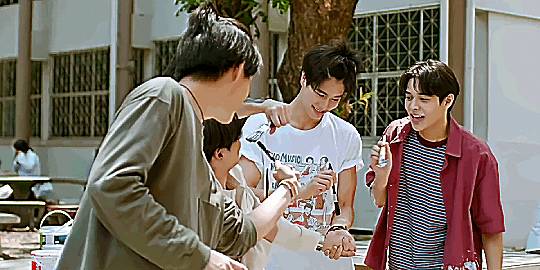




I feel at ease being with you guys. I can do whatever I want. I can be silly if I want to. I can act like a kid if I want to.
#we are the series#we are#we are series#thai bl#bl drama#bl series#maxine gifs#to see them being like this is such a joy#their friendship is wonderful and I'm glad Toey is becoming a part of this group
120 notes
·
View notes
Text
NOT WANDEE MAKING FLIRTY EYES AT YORYAK WHILE HE'S TRYING TO SERIOUSLY TEACH HIM HOW TO BOX THESE CLOWNS CRACK ME UP FR
#wandee goodday#wandee goodday the series#thai bl#boy group#gmmtv series#inn sarin#great sapol#yoryakwandee#yakdee#asiandramanet#thai bl drama#bl series#asianlgbtqdramas#asian lgbtq dramas
62 notes
·
View notes
Text
i fucking hate matt hubris bro why is he so ugly why is he making those noises in tbe end.wmv can you shut up bitch all smiling what the fuck wre you smiling for You wanna sit here and play with me about my motherfucking Stoicism wanna play about my motherfucking Stoicism bitch wanna sit up there and try to do that bitch little do you know little do you know ! know enough people watch i'm coming to fuck you u
#jadusabllle#jadusable#jadusable arg#matt hubris#i hate matt hubris#have a whole roblox group called matt hubris hate club#why is he like thay#ben drowned#ben drowned arg
48 notes
·
View notes